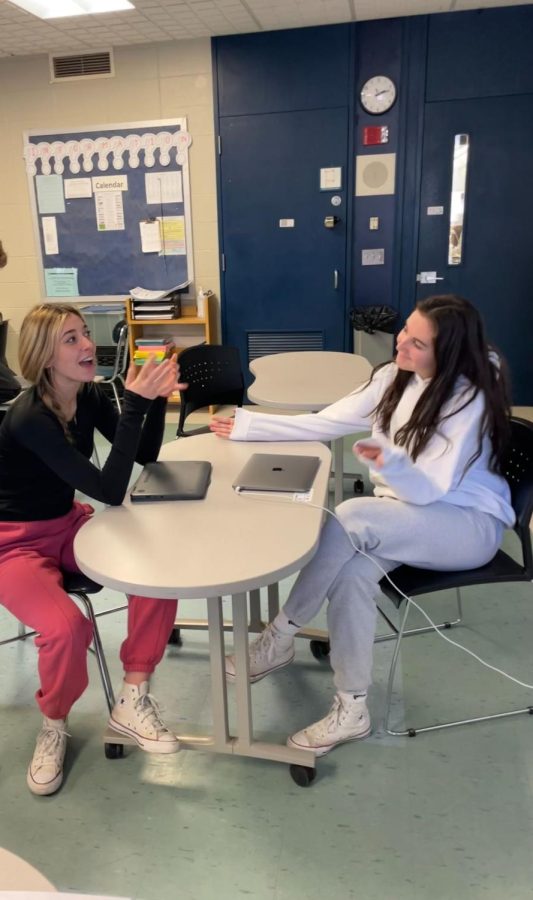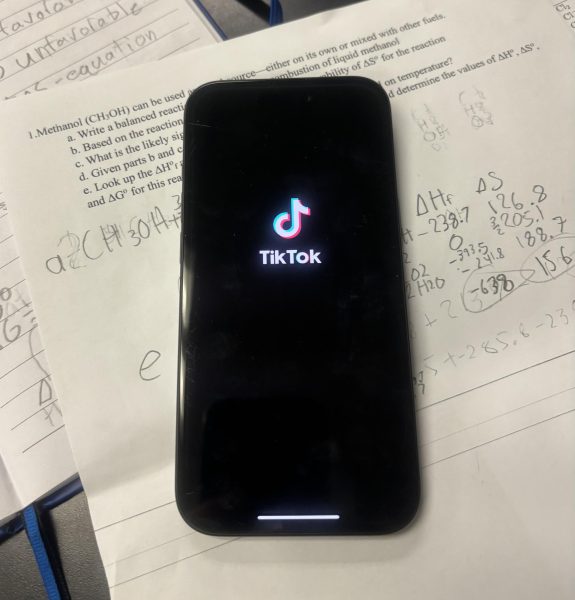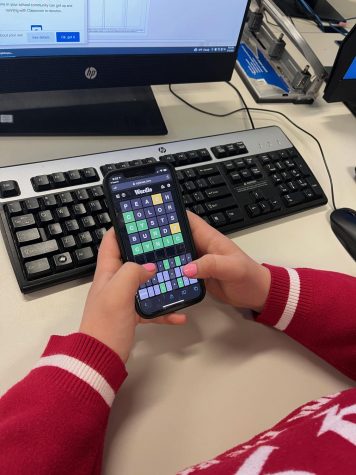Should People Stop Texting??
Junior Sofia Savino and senior Ellie Gay-Killeen having a conversation
Imagine the world with no more texting or emails, and the only way to communicate with someone is in person or through a phone call. Would the world be better or worse?
In today’s world, communicating without verbally speaking is so common. There are ways to get in contact with someone whenever you need to by texting them, emailing them, or sending messages through social media. It’s very convenient but what are the downsides to less face-to-face interaction?
“A physical presence is essential to drive home a point or defend one’s point of view,” according to Forbes.
In a recent investigation, I spent 48 hours trying to communicate with people only through phone calls or in person. I wanted to see if this was even possible for me to do. Instead of texting a friend, I called them. Instead of emailing one of my teachers about a question I had, I made time to go talk to them in person.
The first morning of this experiment I woke up and immediately checked my phone like I always do, except this time I saw a reminder across the screen telling me today was the start of no texting. When I got to school, something came up and I needed to talk to my mom. I went to text her and remembered I would have to call her instead.
The tough part with this was that I was sitting in class and obviously couldn’t just make a phone call. This was the first time the experiment made my life harder. A text that could have taken two minutes to send while still listening to what was going on in class, turned into me leaving class for ten minutes to make a phone call in the hallway. This day was also the very first day of softball tryouts. As the only captain, I needed to be available to text the other players or my coach, answering any questions they may have. I excluded the softball group chat from my experiment because there was just no way I couldn’t text those specific people.
Throughout the day my mom would send me texts and I’d have to call her to remind her I wasn’t able to text back, which was just another inconvenience to me. Since I was in school, not texting my friends wasn’t a huge issue because everyone was here with me.
After the first day I didn’t think I could continue with the experiment. There were multiple occasions I needed to email a teacher and had no time to go talk to them in person. This experiment was a good eye opener to what life could be like without texting or talking to people through social media but I found it more inconvenient than beneficial.
According to NCMIC, titled Electronic Communication vs. Face-to-Face Communication, only 10% of a conversation is the verbal aspect, while 30% consists of tone, and 60% is body language.
Angela Curtis, Triton’s school psychologist says there are benefits to our phones and the ways we communicate with them. Our phones give us constant connection to the whole world and we are able to check in on people whenever and wherever. They’re also good to have in case of an emergency. Curtis also mentions the many negatives that go along with the positives. According to Curtis, texting can hinder proper writing mechanics because slang or incorrect punctuation is frequently used. It also hinders memory because you can rely on your phone to hold information such as phone numbers, directions, and general information that you can now “Google”.
Communicating in ways other than in person or over the phone leads to miscommunication.
“Talking on the phone as a phone call you can at least hear someone’s inflection in their voice versus a text message or social media post…there’s no tone, there’s no inflection, there’s no eye contact, there’s no reading of nonverbal cues,” said Curtis.
When texting you have to rely on only their words and punctuation, and emojis if they are used at all. That leaves a lot of room for worry of taking the message the wrong way. Waiting for a response can also lead to lots of worry.
Curtis says there is also a lack of empathy when texting. People tend to be more hurtful over text, whether it’s on accident or on purpose.
“It decreases empathy in what you feel towards that person because all you need to do is send that text message and then you don’t necessarily have to see how they’re feeling or experience that with them,” said Curtis.
My mom, Elizabeth Bovio, hated me partaking in this experiment. She would frequently text me throughout the day even though I told her I was doing this experiment, because she kept forgetting. I would try to call her and she wouldn’t be able to pick up while at work, but she would have been able to answer a quick text.
“There are times when I only want to text you something real quick and not disturb what I’m doing or what you’re doing,” said Bovio.
According to GoodTherapy, titled How Texting Changes Communication, texting increases small talk and it can be a great asset to people beginning to form a relationship as they are usually much more comfortable over text.
Although there are many benefits to communicating with someone in person, sometimes it is more convenient to communicate in other ways, such as a text message.

My name is Maddy Jacques and I am a senior at Triton High School.
Outside of school I’m either playing softball, hanging out with friends, or watching...





